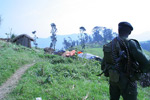
For civilians wracked by waves of violence in eastern Congo, a peace agreement is only a meaningful event if it leads to improvements in their daily lives. In that regard, the verdict is still very much out on the latest agreement—a deal reached last Monday between the Congolese government and the CNDP rebels formerly led by deposed warlord Laurent Nkunda. U.N. Special Envoy Olusegun Obasanjo and Great Lakes region envoy Benjamin Mkapa helped to finalize the deal, though it is still very much an agreement on principles moving forward. If anything is to be learned from the last peace agreement signed in Goma, implementation and sustained follow-through is now mission critical.
Congolese have plenty of reasons to be skeptical. For a brief moment in early 2008, the situation looked equally promising when the CNDP and 22 other armed groups had signed a framework agreement to end the fighting and integrate militarily. However, implementation of that agreement quickly stalled and prospects for a sustainable peace faded as it became obvious that the Congolese government and the CNDP entered into the agreement with divergent intentions. The government sought to dilute CNDP’s influence by lumping them in technical negotiations over military integration with a litany of other armed groups. On the other hand, Nkunda and the CNDP sought to use agreement as a stepping stone toward political talks—something that the government wasn’t willing to do.
With Nkunda and his ambitious political agenda now removed from the scene and CNDP neutered militarily, Monday’s agreement could be a step forward. On paper, the deal transforms the CNDP (which in French stands for National Congress for the Defense of People) into a legitimate political party. In return for ending the armed rebellion, the government guaranteed the liberation of CNDP prisoners and promised a general amnesty for CNDP members who join the Congolese army or police.
This agreement effectively ends the CNDP rebellion, but the political and military situation in the southern portion of North Kivu is shifting dramatically in their favor. Before Nkunda’s removal and Rwanda’s military incursion into eastern Congo earlier this year, very few Congolese Hutus or Tutsis—known informally as “Rwandaphones” for their shared language—held positions of power in North Kivu. As the operations came to a close, former North Kivu governor Eugene Serufuli (also a founding member of the RCD, Rwanda’s proxy rebel group from the late 1990s until the 2006 election) resurrected the idea of splitting North Kivu into two along ethnic lines: ethnic Nande-majority territories to the north and Rwandaphone-majority territories in the south. North Kivu is now witnessing the calculated re-emergence of a “Rwandaphonie” authority in the Petit Nord territories of southern North Kivu, with former CNDP members assuming administrative and military control.
The details of the deal between Congo and Rwanda that allowed Rwandan forces into eastern Congo are still unknown, but the return of Rwandaphonie is almost certainly a part of what was agreed upon. In exchange for removing Nkunda—a huge political liability for Kinshasa—Rwanda now appears to have been granted proxy authority over southern North Kivu, an area where it has many economic interests. This is not without significant risk, as the non-Rwandaphone community is suddenly out in the cold.
Stay tuned.
Rebecca is Enough’s field analyst in eastern Congo.

